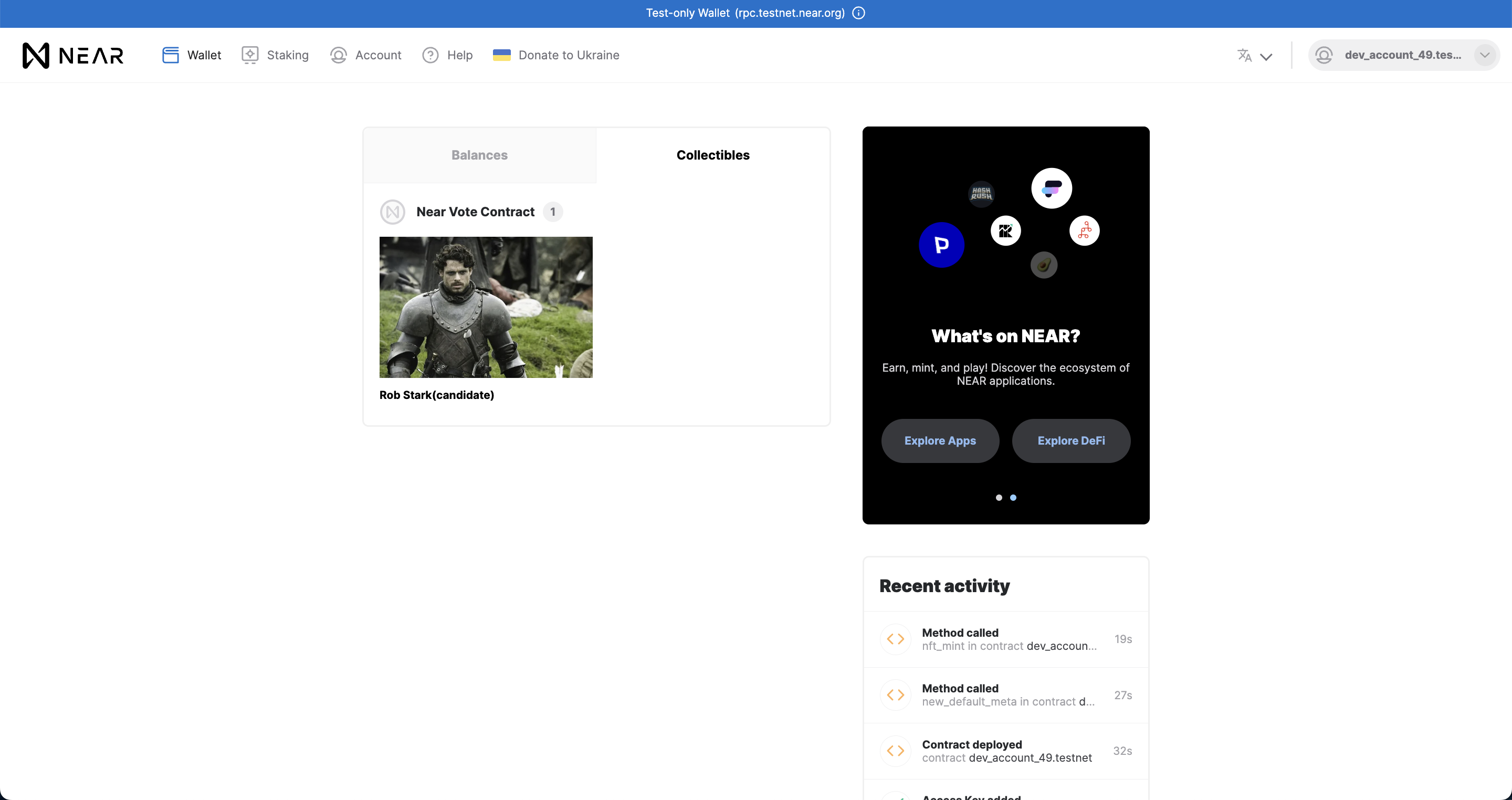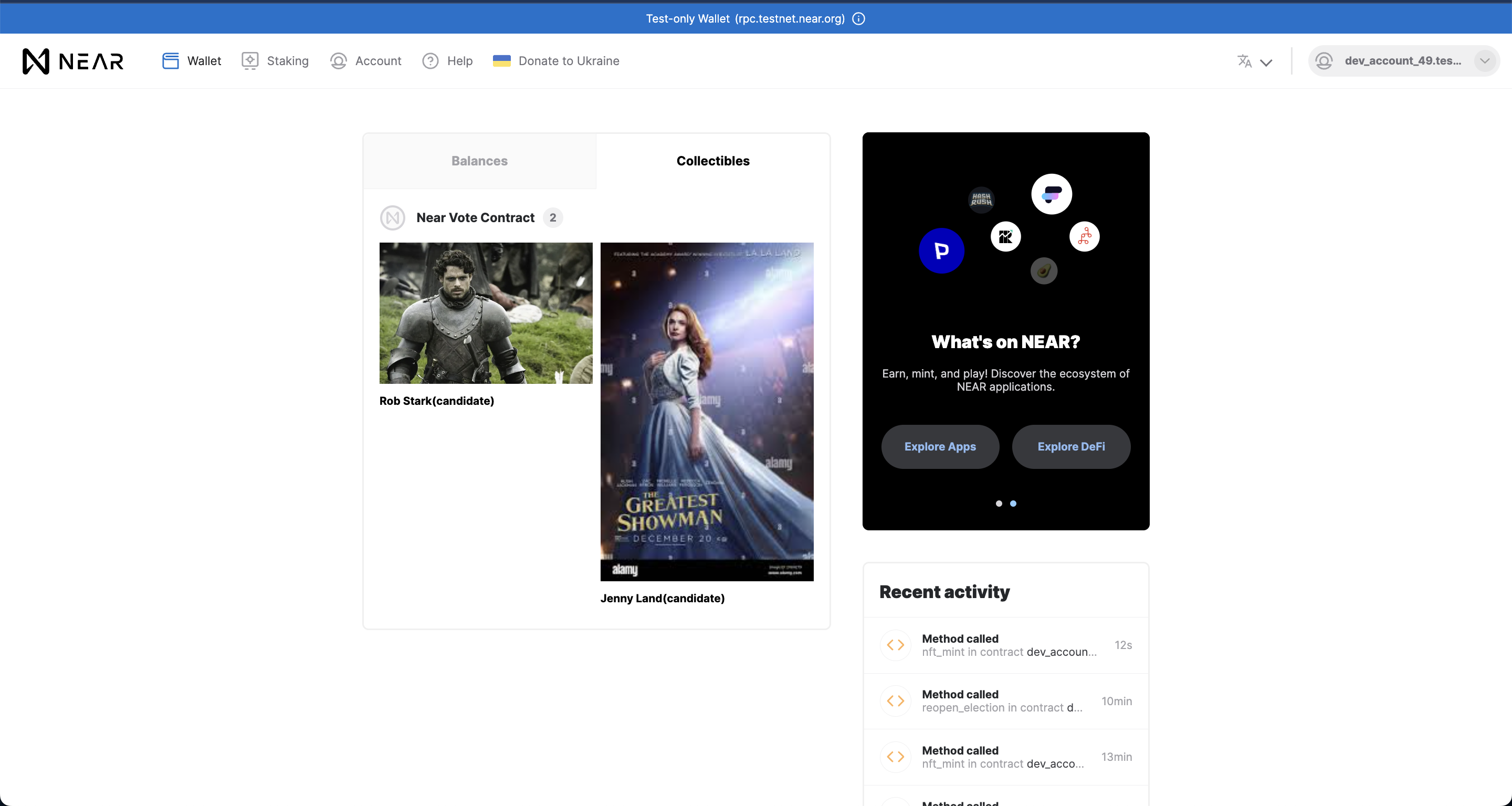lesson-3_作成した機能をテストしよう
✅ 投票機能をテストしてみよう
前回までのセクションで投票機能を実装してコントラクトとしては完成したので実際に機能しているか�ターミナル上で確認してみましょう!
テストの方法は2つあり
- テスト用の関数を走らせて、思った通りの挙動をするか一気にテストする
- 実際にdeployしてターミナル上から関数を動かして確認する
です。
まずは手軽にできる1つ目の方法でテストして、それが成功したら2つ目のテストをしましょう。
1つ目のテストは他の人がすぐにコードのテストができるという意味でも重要なのでテストを入れることを癖づけていきましょう!
lib.rsに移動して以下のようにコードを追加してください。
注意点として、追加するテストはimpl Contractの外に書いてください!
[lib.rs]
use near_sdk::borsh::{self, BorshDeserialize, BorshSerialize};
use near_sdk::collections::{LazyOption, LookupMap, UnorderedMap, UnorderedSet};
use near_sdk::json_types::U128;
use near_sdk::serde::{Deserialize, Serialize};
use near_sdk::{env, near_bindgen, AccountId, Balance, CryptoHash, PanicOnDefault, Promise};
mod enumeration;
mod internal;
mod metadata;
mod mint;
mod nft_core;
mod vote;
pub use crate::enumeration::*;
use crate::internal::*;
pub use crate::metadata::*;
pub use crate::mint::*;
pub use crate::nft_core::*;
pub use vote::*;
#[near_bindgen]
#[derive(BorshDeserialize, BorshSerialize, PanicOnDefault)]
pub struct Contract {
// contract state value
pub owner_id: AccountId,
pub tokens_per_owner: LookupMap<AccountId, UnorderedSet<TokenId>>,
pub tokens_per_kind: LookupMap<TokenKind, UnorderedSet<TokenId>>,
pub tokens_by_id: LookupMap<TokenId, TokenOwner>,
pub token_metadata_by_id: UnorderedMap<TokenId, TokenMetadata>,
pub metadata: LazyOption<NFTContractMetadata>,
pub token_id_counter: u128,
pub likes_per_candidate: LookupMap<TokenId, Likes>,
pub added_voter_list: LookupMap<ReceiverId, TokenId>,
pub voted_voter_list: LookupMap<ReceiverId, u128>,
pub is_election_closed: bool,
}
#[derive(BorshSerialize)]
pub enum StorageKey {
TokensPerOwner,
TokensPerKind,
TokensPerOwnerInner { account_id_hash: CryptoHash },
TokensPerKindInner { token_kind: TokenKind },
TokensById,
TokenMetadataById,
TokensPerTypeInner { token_type_hash: CryptoHash },
NFTContractMetadata,
LikesPerCandidate,
AddedVoterList,
VotedVoterList,
}
#[near_bindgen]
impl Contract {
// function for initialization(new_default_meta)
#[init]
pub fn new(owner_id: AccountId, metadata: NFTContractMetadata) -> Self {
let this = Self {
owner_id,
tokens_per_owner: LookupMap::new(StorageKey::TokensPerOwner.try_to_vec().unwrap()),
tokens_per_kind: LookupMap::new(StorageKey::TokensPerKind.try_to_vec().unwrap()),
tokens_by_id: LookupMap::new(StorageKey::TokensById.try_to_vec().unwrap()),
token_metadata_by_id: UnorderedMap::new(
StorageKey::TokenMetadataById.try_to_vec().unwrap(),
),
metadata: LazyOption::new(
StorageKey::NFTContractMetadata.try_to_vec().unwrap(),
Some(&metadata),
),
token_id_counter: 0,
likes_per_candidate: LookupMap::new(
StorageKey::LikesPerCandidate.try_to_vec().unwrap(),
),
added_voter_list: LookupMap::new(StorageKey::AddedVoterList.try_to_vec().unwrap()),
voted_voter_list: LookupMap::new(StorageKey::VotedVoterList.try_to_vec().unwrap()),
is_election_closed: false,
};
this
}
// initialization function
#[init]
pub fn new_default_meta(owner_id: AccountId) -> Self {
Self::new(
owner_id,
NFTContractMetadata {
spec: "nft-1.0.0".to_string(),
name: "Near Vote Contract".to_string(),
description: "This contract is design for fair election!".to_string(),
},
)
}
}
+ #[cfg(all(test, not(target_arch = "wasm32")))]
+ mod tests {
+ use near_sdk::test_utils::{accounts, VMContextBuilder};
+ use near_sdk::testing_env;
+ use std::collections::HashMap;
+
+ use super::*;
+
+ const MINT_STORAGE_COST: u128 = 100000000000000000000000;
+
+ fn get_context(predecessor_account_id: AccountId) -> VMContextBuilder {
+ let mut builder = VMContextBuilder::new();
+ builder
+ .current_account_id(accounts(0))
+ .signer_account_id(predecessor_account_id.clone())
+ .predecessor_account_id(predecessor_account_id);
+ builder
+ }
+
+ #[test]
+ fn mint_test() {
+ let mut context = get_context(accounts(1));
+ testing_env!(context.build());
+ let mut contract = Contract::new_default_meta(accounts(1).into());
+ testing_env!(context
+ .storage_usage(env::storage_usage())
+ .attached_deposit(MINT_STORAGE_COST)
+ .predecessor_account_id(accounts(1))
+ .build());
+
+ assert_eq!(contract.owner_id, accounts(1));
+
+ contract.nft_mint(
+ TokenMetadata {
+ title: None,
+ description: None,
+ media: "https...".to_string(),
+ media_CID: "Qeo...".to_string(),
+ candidate_name: None,
+ candidate_manifest: None,
+ token_kind: "candidate".to_string(),
+ token_id: None,
+ },
+ accounts(1),
+ );
+
+ assert_eq!(u128::from(contract.nft_total_supply()), 1);
+
+ let nft_info = contract.nft_tokens(None, None);
+ assert_eq!(nft_info[0].metadata.media, "https...".to_string());
+ assert_eq!(u128::from(contract.nft_supply_for_owner(accounts(1))), 1);
+ assert_eq!(
+ nft_info[0].owner_id,
+ contract.nft_tokens_for_owner(accounts(1), None, None)[0].owner_id
+ );
+ assert_eq!(
+ nft_info[0].owner_id,
+ contract.nft_tokens_for_kind("candidate".to_string(), None, None)[0].owner_id
+ );
+ }
+
+ #[test]
+ fn vote_closed_test() {
+ let mut context = get_context(accounts(1));
+ testing_env!(context.build());
+ let mut contract = Contract::new_default_meta(accounts(1).into());
+ testing_env!(context
+ .storage_usage(env::storage_usage())
+ .attached_deposit(MINT_STORAGE_COST)
+ .predecessor_account_id(accounts(1))
+ .build());
+ assert_eq!(contract.is_election_closed, false);
+
+ contract.close_election();
+ assert_eq!(contract.is_election_closed, true);
+
+ contract.reopen_election();
+ assert_eq!(contract.is_election_closed, false);
+ }
+
+ #[test]
+ fn transfer_test() {
+ let mut context = get_context(accounts(1));
+ testing_env!(context.build());
+ let mut contract = Contract::new_default_meta(accounts(1).into());
+ testing_env!(context
+ .storage_usage(env::storage_usage())
+ .attached_deposit(MINT_STORAGE_COST)
+ .predecessor_account_id(accounts(1))
+ .build());
+
+ contract.nft_mint(
+ TokenMetadata {
+ title: None,
+ description: None,
+ media: "https...".to_string(),
+ media_CID: "Qeo...".to_string(),
+ candidate_name: None,
+ candidate_manifest: None,
+ token_kind: "candidate".to_string(),
+ token_id: None,
+ },
+ accounts(1),
+ );
+
+ testing_env!(context
+ .storage_usage(env::storage_usage())
+ .attached_deposit(1)
+ .predecessor_account_id(accounts(1))
+ .build());
+
+ contract.nft_transfer(accounts(2), 0);
+
+ let nft_info = contract.nft_tokens(None, None);
+ assert_eq!(nft_info[0].owner_id, accounts(2));
+ }
+ }
3つあるテストの関数を1つずつみていきましょう。
まず最初に宣言しているget_context関数というのはテストをしているのではなく、テストをするための仮想的なチェーン(Virtual Machine)をビルドするためのものです。
fn get_context(predecessor_account_id: AccountId) -> VMContextBuilder {
let mut builder = VMContextBuilder::new();
builder
.current_account_id(accounts(0))
.signer_account_id(predecessor_account_id.clone())
.predecessor_account_id(predecessor_account_id);
builder
}
次にかかれているmint_test関数は文字通りmintがうまくできているかをテストしています。
最初の部分で初期化のための関数であるnew_default_meta関数を呼び、その後mintのための関数であるnft_mint関数を読んだ後に、NFTの情報を見るために前回までで作成した関数を呼び思ったような挙動をしているのかを確認します。
assert_eq!()というメソッドはひとつ目の引数と2つ目の引数が一致していなければerrorを出すようになものです。
NFTの全ての情報を確認するのは面倒なのでNFTの中の情報の一部がきちんと一致しているかをテストしています。
#[test]
fn mint_test() {
let mut context = get_context(accounts(1));
testing_env!(context.build());
let mut contract = Contract::new_default_meta(accounts(1).into());
testing_env!(context
.storage_usage(env::storage_usage())
.attached_deposit(MINT_STORAGE_COST)
.predecessor_account_id(accounts(1))
.build());
assert_eq!(contract.owner_id, accounts(1));
contract.nft_mint(
TokenMetadata {
title: None,
description: None,
media: "https...".to_string(),
media_CID: "Qeo...".to_string(),
candidate_name: None,
candidate_manifest: None,
token_kind: "candidate".to_string(),
token_id: None,
},
accounts(1),
);
assert_eq!(u128::from(contract.nft_total_supply()), 1);
let nft_info = contract.nft_tokens(None, None);
assert_eq!(nft_info[0].metadata.media, "https...".to_string());
assert_eq!(u128::from(contract.nft_supply_for_owner(accounts(1))), 1);
assert_eq!(
nft_info[0].owner_id,
contract.nft_tokens_for_owner(accounts(1), None, None)[0].owner_id
);
assert_eq!(
nft_info[0].owner_id,
contract.nft_tokens_for_kind("candidate".to_string(), None, None)[0].owner_id
);
}
この部分によってNEARをdepositしています。これはストレージを確保するためのもので、mint, transferのために必要になります。
testing_env!(context
.storage_usage(env::storage_usage())
.attached_deposit(MINT_STORAGE_COST)
.predecessor_account_id(accounts(1))
.build());
次のvote_closed_test関数では投票を終了することにまつわる関数がうまく動いているかを確認しています。
fn vote_closed_test() {
let mut context = get_context(accounts(1));
testing_env!(context.build());
let mut contract = Contract::new_default_meta(accounts(1).into());
testing_env!(context
.storage_usage(env::storage_usage())
.attached_deposit(MINT_STORAGE_COST)
.predecessor_account_id(accounts(1))
.build());
assert_eq!(contract.is_election_closed, false);
contract.close_election();
assert_eq!(contract.is_election_closed, true);
contract.reopen_election();
assert_eq!(contract.is_election_closed, false);
}
最後のtransfer_test関数ではNFTのtransfer機能がうまく動いているのか、つまりきちんとNFTの所有者が移譲されているかを確認しています。
fn transfer_test() {
let mut context = get_context(accounts(1));
testing_env!(context.build());
let mut contract = Contract::new_default_meta(accounts(1).into());
testing_env!(context
.storage_usage(env::storage_usage())
.attached_deposit(MINT_STORAGE_COST)
.predecessor_account_id(accounts(1))
.build());
contract.nft_mint(
TokenMetadata {
title: None,
description: None,
media: "https...".to_string(),
media_CID: "Qeo...".to_string(),
candidate_name: None,
candidate_manifest: None,
token_kind: "candidate".to_string(),
token_id: None,
},
accounts(1),
);
testing_env!(context
.storage_usage(env::storage_usage())
.attached_deposit(1)
.predecessor_account_id(accounts(1))
.build());
contract.nft_transfer(accounts(2), 0);
let nft_info = contract.nft_tokens(None, None);
assert_eq!(nft_info[0].owner_id, accounts(2));
}
それではNEAR-Election-dAppディレクトリにいる状態で、下のコマンドをターミナルで実行しテストをしてみましょう!
yarn contract test
下のような結果が返ってきていれば成功です!
running 3 tests
test tests::vote_closed_test ... ok
test tests::mint_test ... ok
test tests::transfer_test ... ok
test result: ok. 3 passed; 0 failed; 0 ignored; 0 measured; 0 filtered out; finished in 0.00s
Doc-tests near-election-dapp-contract
running 0 tests
test result: ok. 0 passed; 0 failed; 0 ignored; 0 measured; 0 filtered out; finished in 0.00s
これで基本的な関数は動いていることが確認できました。
次は実際のtestnetにデプロイして挙動を確認してみましょう!
前回の実装でそれぞ�れの候補者に紐づいた得票数のmapへの処理を加えたましたが、それまでにdeployされたNFTの情報はmapに反映されずエラーが起きる可能性があります。
なので再度新しいwalletのidを作成して新しいコントラクトとしてdeployしてみましょう!
こちらから作成できます。
section1-lesson4で行ったnew_default_meta関数をターミナルで走らせるところまで行いましょう。
具体的にはexport...からnear call $NFT_CONTRACT_ID new_default_meta...のところまでやりましょう!
それが完了したらpackages/contractへ移動して下のコマンドをターミナルで実行させ、候補者のNFTをmintしてみましょう!
画像のCID(IPFSで保存された画像のURI)やtitleは自由に変えてもらって大丈夫です!
near call $NFT_CONTRACT_ID nft_mint '{"metadata": {"title": "Rob Stark(candidate)", "description": "Forth Token", "media": "https://gateway.pinata.cloud/ipfs/QmQaBSeg58JcWkCxzGhqHiy9SSUugH9MtV8UnZQ3siMRYA", "media_CID": "QmQaBSeg58JcWkCxzGhqHiy9SSUugH9MtV8UnZQ3siMRYA", "candidate_name": "Rob Stark", "candidate_manifest": "In three words I can sum up everything I have learned about life it goes on.", "token_kind": "candidate"}, "receiver_id": "'$NFT_CONTRACT_ID'"}' --accountId $NFT_CONTRACT_ID --amount 0.1
これによって下のように新しく作成したwalletに候補者のNFTがmintされているはずです。

まずは下のコマンドでmintしたNFTの値を確認してみましょう!
near view $NFT_CONTRACT_ID nft_tokens
下のようにNFTのmetadataが返ってくるはずです。
[
{
owner_id: 'YOUR_WALLET_ID',
metadata: {
title: 'Rob Stark(candidate)',
description: 'Forth Token',
media: 'https://gateway.pinata.cloud/ipfs/QmQaBSeg58JcWkCxzGhqHiy9SSUugH9MtV8UnZQ3siMRYA',
media_CID: 'QmQaBSeg58JcWkCxzGhqHiy9SSUugH9MtV8UnZQ3siMRYA',
candidate_name: 'Rob Stark',
candidate_manifest: 'In three words I can sum up everything I have learned about life it goes on.',
token_kind: 'candidate',
token_id: 0
}
}
次にこのNFTに紐づいた得票数を確認してみましょう。
near call $NFT_CONTRACT_ID nft_return_candidate_likes '{"token_id": 0}' --accountId $NFT_CONTRACT_ID
0という値が返ってくるはずです。
今度はNFTに紐づいた得票数を1大きくしてみましょう。
near call $NFT_CONTRACT_ID nft_add_likes_to_candidate '{"token_id": 0}' --accountId $NFT_CONTRACT_ID
返り値はないですが、再び下のコマンドを実行しこのNFTに紐づいた得票数を確認してみましょう。
near call $NFT_CONTRACT_ID nft_return_candidate_likes '{"token_id": 0}' --accountId $NFT_CONTRACT_ID
1という値が返ってくれば成功です!
次は投票の締め切りができるか、また締め切っているのか確認できるかをテストしてみましょう!
下のコマンドで現在投票が締め切られているか確認してみましょう。
near view $NFT_CONTRACT_ID if_election_closed
falseが返ってくるでしょう。
これは投票が締まっていないことを示しています。
では次に投票を締め切りましょう。
near call $NFT_CONTRACT_ID close_election --accountId $NFT_CONTRACT_ID
再度、下のコマンドを入力してみてください。
near view $NFT_CONTRACT_ID if_election_closed
trueに変わっているはずです。
では試しに下のコマンドをターミナルで実行させて違う候補者のNFTをmintしてみましょう。
near call $NFT_CONTRACT_ID nft_mint '{"metadata": {"title": "Jenny Lind(candidate)", "description": "Seventh Token", "media": "https://gateway.pinata.cloud/ipfs/QmWUzLowW5ErzoezkpdSVZNF5LFgWTtMhiwfAdZU9LhcgF", "media_CID": "QmWUzLowW5ErzoezkpdSVZNF5LFgWTtMhiwfAdZU9LhcgF", "candidate_name": "Jenny Lind", "candidate_manifest": "Be yourself everyone else is already taken.", "token_kind": "candidate"}, "receiver_id": "'$NFT_CONTRACT_ID'"}' --accountId $NFT_CONTRACT_ID --amount 0.1
panic(rustにおけるerror)が起こっていればOKです。
なぜなら投票が終了していたらmintもtransferも投票もできないようにしていますからね。
では投票を再開してみましょう。
near call $NFT_CONTRACT_ID reopen_election --accountId $NFT_CONTRACT_ID
次に現在投票が再開されているか確認してみましょう。
near view $NFT_CONTRACT_ID if_election_closed
これでfalseに戻っていれば成功です。
では先ほど試みたmintをもう一度してみましょう!下のコマンドをターミナルで実行させてください。
near call $NFT_CONTRACT_ID nft_mint '{"metadata": {"title": "Jenny Lind(candidate)", "description": "Seventh Token", "media": "https://gateway.pinata.cloud/ipfs/QmWUzLowW5ErzoezkpdSVZNF5LFgWTtMhiwfAdZU9LhcgF", "media_CID": "QmWUzLowW5ErzoezkpdSVZNF5LFgWTtMhiwfAdZU9LhcgF", "candidate_name": "Jenny Lind", "candidate_manifest": "Be yourself everyone else is already taken.", "token_kind": "candidate"}, "receiver_id": "'$NFT_CONTRACT_ID'"}' --accountId $NFT_CONTRACT_ID --amount 0.1
投票が再開されているのでmintが成功して下のようになっているはずです。

🧙♂️ テストを作成・実行する
ここまでの作業でコントラクトには基本機能として以下の機能が追加されました。
- NFTをmintする機能
- 投票を終わらせる機能
- 投票券を送信する機能
これらの基本機能をテストスクリプトとして記述していきましょう。
ではlib.rsの内容を以下の��ように編集していきましょう。
use near_sdk::borsh::{self, BorshDeserialize, BorshSerialize};
use near_sdk::collections::{LazyOption, LookupMap, UnorderedMap, UnorderedSet};
use near_sdk::json_types::U128;
use near_sdk::serde::{Deserialize, Serialize};
use near_sdk::{env, near_bindgen, AccountId, Balance, CryptoHash, PanicOnDefault, Promise};
mod enumeration;
mod internal;
mod metadata;
mod mint;
mod nft_core;
mod vote;
pub use crate::enumeration::*;
use crate::internal::*;
pub use crate::metadata::*;
pub use crate::mint::*;
pub use crate::nft_core::*;
pub use vote::*;
#[near_bindgen]
#[derive(BorshDeserialize, BorshSerialize, PanicOnDefault)]
pub struct Contract {
// contract state value
pub owner_id: AccountId,
pub tokens_per_owner: LookupMap<AccountId, UnorderedSet<TokenId>>,
pub tokens_per_kind: LookupMap<TokenKind, UnorderedSet<TokenId>>,
pub tokens_by_id: LookupMap<TokenId, TokenOwner>,
pub token_metadata_by_id: UnorderedMap<TokenId, TokenMetadata>,
pub metadata: LazyOption<NFTContractMetadata>,
pub token_id_counter: u128,
pub likes_per_candidate: LookupMap<TokenId, Likes>,
pub added_voter_list: LookupMap<ReceiverId, TokenId>,
pub voted_voter_list: LookupMap<ReceiverId, u128>,
pub is_election_closed: bool,
}
#[derive(BorshSerialize)]
pub enum StorageKey {
TokensPerOwner,
TokensPerKind,
TokensPerOwnerInner { account_id_hash: CryptoHash },
TokensPerKindInner { token_kind: TokenKind },
TokensById,
TokenMetadataById,
TokensPerTypeInner { token_type_hash: CryptoHash },
NFTContractMetadata,
LikesPerCandidate,
AddedVoterList,
VotedVoterList,
}
#[near_bindgen]
impl Contract {
// function for initialization(new_default_meta)
#[init]
pub fn new(owner_id: AccountId, metadata: NFTContractMetadata) -> Self {
let this = Self {
owner_id,
tokens_per_owner: LookupMap::new(StorageKey::TokensPerOwner.try_to_vec().unwrap()),
tokens_per_kind: LookupMap::new(StorageKey::TokensPerKind.try_to_vec().unwrap()),
tokens_by_id: LookupMap::new(StorageKey::TokensById.try_to_vec().unwrap()),
token_metadata_by_id: UnorderedMap::new(
StorageKey::TokenMetadataById.try_to_vec().unwrap(),
),
metadata: LazyOption::new(
StorageKey::NFTContractMetadata.try_to_vec().unwrap(),
Some(&metadata),
),
token_id_counter: 0,
likes_per_candidate: LookupMap::new(
StorageKey::LikesPerCandidate.try_to_vec().unwrap(),
),
added_voter_list: LookupMap::new(StorageKey::AddedVoterList.try_to_vec().unwrap()),
voted_voter_list: LookupMap::new(StorageKey::VotedVoterList.try_to_vec().unwrap()),
is_election_closed: false,
};
this
}
// initialization function
#[init]
pub fn new_default_meta(owner_id: AccountId) -> Self {
Self::new(
owner_id,
NFTContractMetadata {
spec: "nft-1.0.0".to_string(),
name: "Near Vote Contract".to_string(),
reference: "This contract is design for fair election!".to_string(),
},
)
}
}
#[cfg(all(test, not(target_arch = "wasm32")))]
mod tests {
use near_sdk::test_utils::{accounts, VMContextBuilder};
use near_sdk::testing_env;
use std::collections::HashMap;
use super::*;
const MINT_STORAGE_COST: u128 = 100000000000000000000000;
fn get_context(predecessor_account_id: AccountId) -> VMContextBuilder {
let mut builder = VMContextBuilder::new();
builder
.current_account_id(accounts(0))
.signer_account_id(predecessor_account_id.clone())
.predecessor_account_id(predecessor_account_id);
builder
}
#[test]
fn mint_test() {
let mut context = get_context(accounts(1));
testing_env!(context.build());
let mut contract = Contract::new_default_meta(accounts(1).into());
testing_env!(context
.storage_usage(env::storage_usage())
.attached_deposit(MINT_STORAGE_COST)
.predecessor_account_id(accounts(1))
.build());
assert_eq!(contract.owner_id, accounts(1));
contract.nft_mint(
TokenMetadata {
title: None,
description: None,
media: "https...".to_string(),
media_CID: "Qeo...".to_string(),
candidate_name: None,
candidate_manifest: None,
token_kind: "candidate".to_string(),
token_id: None,
},
accounts(1),
);
assert_eq!(u128::from(contract.nft_total_supply()), 1);
let nft_info = contract.nft_tokens(None, None);
assert_eq!(nft_info[0].metadata.media, "https...".to_string());
assert_eq!(u128::from(contract.nft_supply_for_owner(accounts(1))), 1);
assert_eq!(
nft_info[0].owner_id,
contract.nft_tokens_for_owner(accounts(1), None, None)[0].owner_id
);
assert_eq!(
nft_info[0].owner_id,
contract.nft_tokens_for_kind("candidate".to_string(), None, None)[0].owner_id
);
}
#[test]
fn vote_closed_test() {
let mut context = get_context(accounts(1));
testing_env!(context.build());
let mut contract = Contract::new_default_meta(accounts(1).into());
testing_env!(context
.storage_usage(env::storage_usage())
.attached_deposit(MINT_STORAGE_COST)
.predecessor_account_id(accounts(1))
.build());
assert_eq!(contract.is_election_closed, false);
contract.close_election();
assert_eq!(contract.is_election_closed, true);
contract.reopen_election();
assert_eq!(contract.is_election_closed, false);
}
#[test]
fn transfer_test() {
let mut context = get_context(accounts(1));
testing_env!(context.build());
let mut contract = Contract::new_default_meta(accounts(1).into());
testing_env!(context
.storage_usage(env::storage_usage())
.attached_deposit(MINT_STORAGE_COST)
.predecessor_account_id(accounts(1))
.build());
contract.nft_mint(
TokenMetadata {
title: None,
description: None,
media: "https...".to_string(),
media_CID: "Qeo...".to_string(),
candidate_name: None,
candidate_manifest: None,
token_kind: "candidate".to_string(),
token_id: None,
},
accounts(1),
);
testing_env!(context
.storage_usage(env::storage_usage())
.attached_deposit(1)
.predecessor_account_id(accounts(1))
.build());
contract.nft_transfer(accounts(2), 0);
let nft_info = contract.nft_tokens(None, None);
assert_eq!(nft_info[0].owner_id, accounts(2));
}
}
では下のコマンドを実行することでコントラクトのテストをしていきましょう!
yarn contract test
下のような結果がでいれば成功です!
running 3 tests
test tests::vote_closed_test ... ok
test tests::transfer_test ... ok
test tests::mint_test ... ok
test result: ok. 3 passed; 0 failed; 0 ignored; 0 measured; 0 filtered out; finished in 0.00s
Doc-tests near-election-dapp-contract
running 0 tests
test result: ok. 0 passed; 0 failed; 0 ignored; 0 measured; 0 filtered out; finished in 0.00s
✨ Done in 2.06s.
🙋♂️ 質問する
ここまでの作業で何かわからないことがある場合は、Discordの#nearで質問をしてください。
ヘルプをするときのフローが円滑になるので、エラーレポートには下記の4点を記載してください ✨
1. 質問が関連しているセクション番号とレッスン番号
2. 何をしようとしていたか
3. エラー文をコピー&ペースト
4. エラー画面のスクリーンショット
おめでとうございます!
これで投票機能がきちんと実装できていることが確認できました。
セクション2は終了です。
投票が再開され、mintが成功しているフロントエンドのスクリーンショットを#nearに投稿してください 😊
あなたの成功をコミュニティで祝いましょう 🎉
こう見るとシンプルですごさがあまりわかりませんが、たくさんのNFTがmintされてその中から特定のNFTに紐づいた得票数が取得できればすごいと思いませんか! ?
次のセクションからはいよいよフロントエンドでコントラクトとの接続+UI�の作成を行なっていきます。
楽しんでいきましょう!